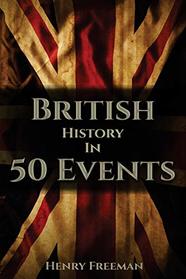How does an author synthesize hundreds of years of history in 50 pages? Hourly History is offering British in 50 bites; thus, the reader will see the high points without any filler. That must have been quite a challenge to only choose 50 for a country that has such a long history.
Maybe it would be helpful to mention bites that spoke to me. One was about Hadrian's Wall. I've read about it many times but in this book, the monumental size is mentioned: 20 feet high, 10 feet wide, and 73 miles long.
It is interesting that Alfred the Great and William each commissioned books that would have far-reaching effects on England. Alfred's was the 'Anglo-Saxon Chronicle' and helps later scholars understand Middle English. William commissioned the 'Domesday Book' which helped him see how extensive his kingdom was (and how much he could tax his vassals).
The killing of Thomas Becket in 1170 shows the growing tension between kings and the Catholic Church. England's adherence to Catholic teachings would be torn asunder by Henry VIII (in 1534) when he decided that he would be the leader of his own church, the Anglican Church of England.
With a single stroke of her pen, Elizabeth I turned the tiny nation of England into Great Britain when she gave a charter to the East India Company. The trading relationships the EIC created would have unimagined effects on the nation.
The burning of London in 1666, probably prevented a plague epidemic in the London region because the expansive fire killed the vermin population that carried the infection. When Napoleon was put in permanent exile in 1815, it gave Europe a rest from wars and allowed the populace to use the technological improvements to improve the economies of their countries.
The British were the first to make and use tanks in World War I. The first ones were clumsy but improvements over the next 20 years would prove tanks to be the most important equipment for a ground war in the future.
I thought the section on the Battle of Britain was particularly good. The author indicates that Winston Churchill understood that Hitler was using psychology, as well as bombs overhead, to make the British people surrender. Now I understand why Churchill's leadership was so important at that time. This is a fine product with just the right amount of information for the reader to understand the significance of each of the 50 points. Great reading.
Maybe it would be helpful to mention bites that spoke to me. One was about Hadrian's Wall. I've read about it many times but in this book, the monumental size is mentioned: 20 feet high, 10 feet wide, and 73 miles long.
It is interesting that Alfred the Great and William each commissioned books that would have far-reaching effects on England. Alfred's was the 'Anglo-Saxon Chronicle' and helps later scholars understand Middle English. William commissioned the 'Domesday Book' which helped him see how extensive his kingdom was (and how much he could tax his vassals).
The killing of Thomas Becket in 1170 shows the growing tension between kings and the Catholic Church. England's adherence to Catholic teachings would be torn asunder by Henry VIII (in 1534) when he decided that he would be the leader of his own church, the Anglican Church of England.
With a single stroke of her pen, Elizabeth I turned the tiny nation of England into Great Britain when she gave a charter to the East India Company. The trading relationships the EIC created would have unimagined effects on the nation.
The burning of London in 1666, probably prevented a plague epidemic in the London region because the expansive fire killed the vermin population that carried the infection. When Napoleon was put in permanent exile in 1815, it gave Europe a rest from wars and allowed the populace to use the technological improvements to improve the economies of their countries.
The British were the first to make and use tanks in World War I. The first ones were clumsy but improvements over the next 20 years would prove tanks to be the most important equipment for a ground war in the future.
I thought the section on the Battle of Britain was particularly good. The author indicates that Winston Churchill understood that Hitler was using psychology, as well as bombs overhead, to make the British people surrender. Now I understand why Churchill's leadership was so important at that time. This is a fine product with just the right amount of information for the reader to understand the significance of each of the 50 points. Great reading.




